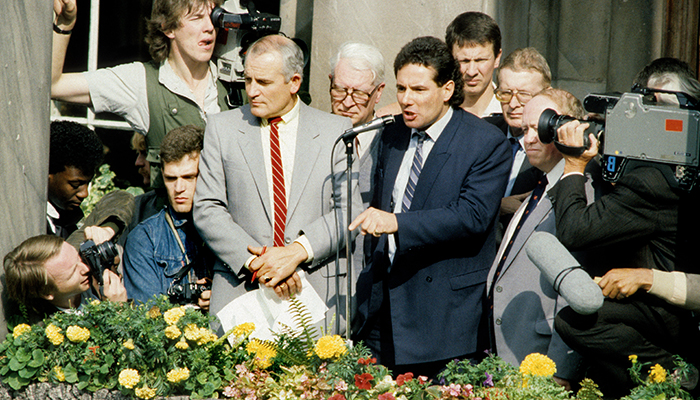So said shadow women and equalities minister Dawn Butler [pictured right below] in her speech at the recent Labour Party conference in Liverpool.
 It was an explicit reference to the slogan and tactics employed by the Militant Tendency faction, which controlled the city’s council in the 1980s and attempted to take on the Thatcher government by setting an illegal budget.
It was an explicit reference to the slogan and tactics employed by the Militant Tendency faction, which controlled the city’s council in the 1980s and attempted to take on the Thatcher government by setting an illegal budget.
Butler’s apparent praise for the Liverpool rebels sparked controversy, with many commentators questioning the wisdom of dredging up memories of a painful episode not just for the Labour Party but in local government history.
Subsequently, the famous clip of then Labour Party leader Neil Kinnock’s 1985 conference speech, where he repudiated the Militant Tendency for playing politics with people’s homes, jobs and services, was shared widely on social media.
Thirty-three years on, institutional memories are fading. Many now working in the local government sector were children at the time, or perhaps not even born.
“I don’t think you should forget history,” says Michael Parkinson, professor and associate pro vice chancellor for civic engagement at Liverpool University, whose 1985 book Liverpool on the Brink provides a detailed account of the episode.
“You get a strain of opinion that says ‘Let’s not talk about the bad old days,’ because it reminds people of what we were. I think it’s very important to remember history, to remember how far we’ve come and how much we’ve changed and how we’re not going back there.”
With this in mind, Public Finance spoke to some the individuals who were there at the time to gather their memories and reflections on the episode’s impact and legacy. They variously described it as a fraught, frightening and depressing time.
The origins of the episode are complex. It was, in the words of one, a “toxic mix” of politics and the technicalities of local government finance.
Local government in the 1980s was a very different beast.
It enjoyed far more financial power, with control of both the domestic and the business rate, large swathes of council housing and therefore rents, as well as responsibility for a wide range of services, which were overwhelmingly provided directly rather than outsourced.
 “It was a broader canvas, both financially and in terms of service delivery than you get today,” says David (now Lord) Blunkett [pictured right], who as leader of Sheffield council and a member of Labour’s National Executive Committee, played a central role in the episode.
“It was a broader canvas, both financially and in terms of service delivery than you get today,” says David (now Lord) Blunkett [pictured right], who as leader of Sheffield council and a member of Labour’s National Executive Committee, played a central role in the episode.
Many local government leaders, such as Blunkett and, in London, Ken Livingstone, also enjoyed much more prominent public profiles than is the case today, particularly if they set themselves up in opposition to prime minister Margaret Thatcher.
Thatcher’s Conservative government, elected in 1979, was determined to rein in public spending, and so, in the early 1980s, cut the grants given to local government.
The sector responded by hiking the rates, prompting the threat of rate capping by government in return. Indeed, legislation to bring in rate-capping powers for central government became a 1983 Conservative manifesto commitment.
The 1984 Rates Act that followed allowed Whitehall to prescribe spending limits for individual authorities.
In Liverpool, where the city’s economy had grown increasingly reliant on the public sector following significant private sector decline in the 1970s, problems were particularly acute. At the same time, the Militant Tendency, a faction of the Revolutionary Socialist League, had taken control of the local Labour party and succeeded in getting increasing number of councillors elected. Most famous was Derek Hatton, who became deputy leader. [Story continues below].

Derek Hatton addressing a crowd in the 1980s
Militant Tendency had a clear revolutionary agenda and saw local government as a vehicle through which to pursue wider political and ideological aims.
“Liverpool had never been a Labour stronghold,” Parkinson points out, and control of the council see-sawed between Labour and the Liberals. This political instability and the fact that local Labour politics had tended to lean to the right meant “entryism was easier… they were good at doing what they had to do”, he says.
In 1984, Liverpool had, in Blunkett’s words, successfully “rattled the cage”, securing some extra funds in a compromise with environment secretary Patrick Jenkin, who oversaw local government.
“This indicated that, if you made a terrific fuss you might get something, which led other authorities to say ‘well, let’s not make a rate’ and it gave some credence to the idea that if you made a stand the government might actually back off,” Blunkett tells PF.
‘Local government in the 1980s was a very different beast. It enjoyed far more financial power, with control of both the domestic and the business rate, large swathes of council housing and therefore rents, as well as responsibility for a wide range of services, which were overwhelmingly provided directly rather than outsourced.’
Inspired by Liverpool, a number of largely Labour-led, urban local authorities, including Blunkett’s Sheffield, threatened to refuse to set a rate.
They were helped, remembers Martin Pilgrim, by a lack of legal clarity around local authority budget setting.
“It was a bit vague as to what would happen if you didn’t make a rate,” says Pilgrim, who was at the time finance under-secretary at the Association of Metropolitan Authorities (a forerunner of the Local Government Association).
“There was quite a lot of momentum across the country for a major gesture for not making a rate for as long as possible,” Blunkett says. This was to heighten tension with Whitehall, "to get attention and to put the government on the back foot” .
This put local government auditors in an awkward position. Auditors were used to having their authority respected, but increasingly bold and bellicose local authority leaders felt no terror of the auditor.
“Even the most extreme councils were run from month to month by officers with whom the [district auditor] and his staff usually had a cordially professional relationship,” writes Duncan Campbell-Smith in his history of the Audit Commission.
“The extremist behaviour often put these officers – and, indeed those of the council’s elected members who did not espouse the radicals’ agenda – in a deeply invidious position.”
In July 1984, Jenkin took advantage of powers contained in the newly passed Rates Act, capping 18 authorities for the 1985-86 financial year, including Sheffield, Lambeth and Islington – although not Liverpool. This was, in Jenkin’s words, to curb the “worst excesses of the highest spenders” and represented “good news for ratepayers”.
By the following year, much of local government’s opposition had receded. Many “pulled back from the brink”, remembers Peter Hetherington, who covered the subject for The Guardian.
Even the most bullish local authority leaders were, when push came to shove, not prepared to lead their authorities over the cliff.
Councillors also bore massive personal risk as they were joint and severally liable for any losses accruing to the authority due to failure to set a rate.
Personal losses “could be huge”, says Pilgrim. “It was a pretty fraught time and very worrying for individuals, particularly individuals who had resources.”
The Audit Commission and district auditors had also been making quiet progress, setting out to councillors the consequences of disqualification and surcharges.
A key change in the political context came with the breaking of the miners’ strike in the spring of 1985.
This boosted central government’s confidence and made it clear to the local authority rebels that ministers would not back down.
“It made all the difference in the world,” Blunkett remembers. “The atmosphere changed completely… the terms of combat had changed.”
Liverpool, however, held out and continued to claim it could not set a budget within the government’s prescribed limit without decimating services. And the council’s stance proved popular with the city’s residents.
“There was a great deal of local chauvinism and a sense that what had happened in the city wasn’t right and wasn’t fair.”
Michael Parkinson, professor and associate pro vice chancellor for civic engagement at Liverpool University
“There was a great deal of local chauvinism and a sense that what had happened in the city wasn’t right and wasn’t fair,” Parkinson tells PF.
“This lot [Militant Tendency] were standing up [for Liverpool] even though they had their own ulterior motives.”
The dispute came to a head at Labour’s autumn conference in Bournemouth, scene of Kinnock’s famous speech.
An attempt to resolve the impasse was partially brokered by Blunkett who, at the 1985 conference, persuaded Militant to “open the books” and let an independent working group go and in and see if they could get the council out of the fix.
The group included some prominent CIPFA members. It was led by GLC finance director and 1984-85 CIPFA president Maurice Stonefrost, who was “everyone’s number one choice”, according to Pilgrim.
Also involved were Sheffield treasurer Gren Folwell, Camden treasurer John Marlow and Pilgrim himself. The team went up to Liverpool and, after a few meetings and a series of interviews, presented their report setting out a way in which the gap might be bridged. “It wasn’t a huge job,” says Pilgrim.
The Stonefrost report, as it became known, put forward four options to get Liverpool through. All involved a mix of rate rises, rent rises, recapitalisation and redundancies.
“It soon became apparent that, as with local authorities now, while things were incredibly tight, they could balance the books without devastating services,” says Blunkett. “It drove a coach and horses through their whole political stance.”
Stonefrost’s recommendations were, however, rejected and the impasse dragged on until a legal budget was finally set on 22 November 1985.
In their book, Militant Liverpool: a city on the edge, Diane Frost and Peter North record that this “included £23m capitalisation, tempered with a £60m loan (£30m a year for two years) from Swiss banks”. Three days later, the Liverpool Labour Party was suspended.
It took another couple of years for things to be finally resolved. In Liverpool, the councillors were disqualified by the district auditor, meanwhile the Labour Party took action to throw out Militant members.
The episode was, says Pilgrim, a “huge step toward the emasculated local government we have now”. Blunkett agrees that its legacy is still felt today in terms of the tension that exists between central and local government.
“There was a major blowback, which was full rate capping that the government then introduced in 1986… they also took away the business rate and nationalised it.”
Could it happen again? Some are concerned that the rise of Momentum in recent years parallels the Militant Tendency. “That questions has yet to be answered,” says Parkinson. “Nobody knows.”
Others, however, disagree. Blunkett is clear that Momentum isn’t at all like Militant, as it lacks the latter’s revolutionary objective. Shadow chancellor John McDonnell has also made clear that the Labour Party leadership is not going to call on local government to act illegally.
There’s a difference, Blunkett stresses, between “being incredibly imaginative, creative and looking at ways of doing things differently” and being asked to break the law. He also notes that the scale of the cuts being demanded by central government in the 1980s were nothing compared to what has been demanded in the last eight years, and which local government has complied with.
“There’s nothing wrong with councillors saying to local authority treasurers and finance officers can you think through how we might reschedule debt or how we might relook at contracts,” Blunkett says.
“There’s everything wrong with asking officers to break the law.”
NB: this article was edited to correct Gren Folwell's job title. PF understands he was treasurer of Sheffield at the time rather than an employee of the Treasury
Further reading
Liverpool on the Brink, Michael Parkinson
Militant Liverpool: a city on the edge, Diane Frost and Peter North
Militant, Michael Crick
Follow the money: the Audit Commission, Public Money and Management of Public Services, 1983-2008, Duncan Campbell-Smith

















